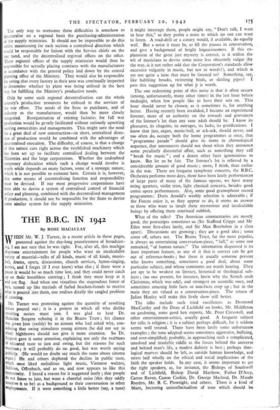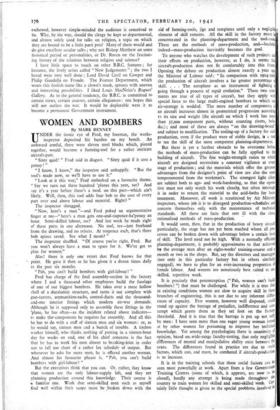THE B.B.C. IN 1942
By ROSE MACAULAY
WHEN Mr. W. J. Turner, in a recent article in these pages, protested against the day-long pauselessness of broadcast- ing, I am not sure that he was right. For, after all, this machine dispenses entertainment for people who want an incalculable variety of materialtalks of all kinds, music of all kinds, music- hall, drama, opera, discussions, church services, hymn-singing, stories, and I forget (if I ever knew) what else ; if there were a pause it would be so much time lost, and they could never catch up on their breathless catering ; I think they must keep at it and not flag. And when one visualises the stupendous forest of ears, turned up like myriads of furled bratken-fronds to receive what is poured into them, one realises dizzily the tangled problem of catering.
Mr. Turner was protesting against the quantity of revolting noises poured out ; it is a protest in which all who dislike revolting noises must join. I was glad to hear Dr. Malcolm Sargent echoing it in the Brains Trust ; his chance was given him (rashly) by an airman who had asked why, con- sidering that swing stimulates young airmen (he did not say to what) highbrows should not give it more attention. So Dr. Sargent gave it some attention, explaining not only the reattions Of educated taste to jazz and swing, but the reasons for such reactions ; it will probably do no good, but was worth saying Publicly. (He would no doubt say much the same about cinema organ,) He and others deplored the decline in public taste, which once liked melodious light music, Viennese waltzes, Sullivan, Offenbach, and so on, and now appears to like this Monstrosity. I heard a reason for it suggested lately ; that people do not listen to jazz, but want a cheerful noise (this they oddly conceive it to be) as a background to their conversation or other employments. If it were something a little better (say, a tune)
it might interrupt them, people might say, " Don't talk, I want to hear this," so they prefer a noise to which no one can want to listen. A road-drill or a canary would, if available, do equally well. But a noise it must be, to fill the pauses in conversation, and give a background of bright loquaciousness. If this ex- planation of the great jazz mystery is correct, is it within the wit of musicians to devise some noise less obscenely vulgar (by the way, is it not rather odd that the Corporation's standards allow excessive vulgarity in music, but not in words?), and which is yet not quite a tune that must be listened to? Something, say, like babbling brooks, twittering birds, or skirling pipes? I pass this suggestion up for what it is worth.
The one redeeming point of this noise is that it often occurs (among, unfortunately, many other times) in the last hour before midnight, when few people like to have their sets on. This hour should never be chosen, as it sometimes is, for anything better. Having recently been invalided, I became an experienced listener, more of an authority on the rewards and grievances of the listener's lot than any sane adult should be. I know its pleasures, its chagrins, its outrages, its lacks, its gratifications. I know that jazz, organ, music-hall, or ack-ack, should never, and too often do, occupy both the home programmes at once, that " programme parade " should give its items in chronological sequence, that announcers should not shout when they announce some peculiarly distasteful affair, such as something they call " break for music " ; and a dozen other facts ignominious to know. But let us be fair. The listener's lot is relieved by a considerable amount of good music ; more, I think, than earlier in the war: There are frequent symphony concerts, the B.B.C. Orchestra performs most days, there have been lately performances of large parts of many of the famous operas, we have many string quartets, violin trios, light classical concerts, besides good comic opera performances. Also, some good gramophone record programmes: Doris Arnold's weekly selection is admirable ; if the Forces enjoy it, as they appear to do, it seems an answer to those who want to insult these mysterious and incalculable beings by offering them continual rubbish.
What of the talks? The American commentaries arc mostly good, the postscripts sometimes so (Sir Stafford Cripps and Mr Eden were first-class lately, and Sir Max Beerbohm in a class apart). Discussions are growing ; they are a good idea ; some come off, others not. The Brains Trust, far the most popular, is always an entertaining conversation-piece, " full," as some one remarked, " of human nature." The inforthation dispensed is its least important feature, as any of it that is correct can be got out of reference-books ; but there is usually someone present who knows something, sometimes a good deal, about some particular subject, and whose comments are worth hearing. They are apt to be weakest on literary, historical or theological sub- jects ; (no one present, for instance, knew why the Scotch snub Christmas, which was odd), and strongest on scientific ones, and sometimes amusing little facts or non-facts crop up ; but in the main they are valued as a conversation-piece. The return of Julian Huxley will make this lively show still better.
The talks include such tried excellences as Desmond MacCarthy and the Dean of Lichfield on books, Mr. Middleton on gardening, some good hen experts, Mr. Peter Cresswell, and other entertainment-critics, usually good. A frequent subject for talks is religion ; it is a subject perhaps difficult, for it seldom seems well treated. There have been lately some unfortunate examples ; the tone adopted seems sometimes aggressive, bullying, and over-simplified; probably, in approaching such a complicated, unsolved and insoluble riddle as the forces behind the universe and behind man's life, a modest dubiety is best ; perhaps theo- logical matters should be left, as outside human knowledge, and stress laid wholly on the ethical and social implications of the faith the speaker holds. In any case, it seems important to get the right speakers, as, for instance, the Bishops of Southwell and of Lichfield, Bishop David Matthew, Father D'Arcy, Canon Raven, Canon Cockin, Dr. George Macleod, Dr. Maude Royden, Mr. B. C. Plowright, and others. There is a kind of blunt, hectoring =intellectualism of tone which should be eschewed, however simple-minded the audience is conceived to be. Why, by the way, should the clergy be kept so departmental, and almost solely used for talks on religion, a topic on which they are bound to be a little parti pris? Many of them would and do give excellent secular talks ; why not Bishop Matthew on some historical period or personalities, or Dr. Raven on the fascinat- ing history of the relations between religion and science?
I have little space to touch on other B.B.C. features ; for instance, the lively series called New Judgements " ; the two I heard were very well done ; Lord David Cecil on Cowper and Philip Guedalla on Fronde. The Feature Department, which wears this foolish name•like a clown's mask, sprouts with uneven and interesting possibilities. I liked Louis MacNeice's Rogues' Gallery. As to the general tendency, the B.B.C. is committed to certain views, certain courses, certain allegiances: one hopes this will not outlast the war. It would be deplorable were it to become a permanent Government instrument.



























 Previous page
Previous page